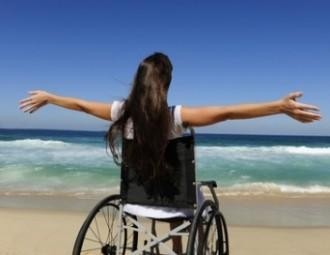Siarhei Drazdouski: It is necessary to prepare the society to accept

Handicrafts made by people with disabilities from Svir institution in Poland soon will be sold in designer shops in Belarus. Experts claim that the works have not only spiritual but also art value.
The project «Therapy in Motion. Social Design Action: Svir-Komarovo-Wąbrzeźno» has two possible directions – says the Belarusan coordinator Sophia Sadovskaya. – First of all it is a therapy for persons with disabilities and secondly it is a development of social business in Belarus.
Handicrafts made by people living in Svir psychoneurological institution really have art value because experienced and famous artists and specialists in ceramics from Belarus work with them. They help people with disabilities to express themselves and sometimes help to finish a handicraft, of course with an author’s agreement.
- Professional artists are involved in the project not only in order that the art-therapy would help people but also to create a qualitative product which can be sold – explains Sophia Sadovskaya.

According to the organizer the initiative’s main goal is not to get profit but to provide steadiness of the art project. The money earned will be spent for paints, clay and salary of professional artists in order to provide the continuation of the project.
- It is not that easy as it may seem – Belarusan designer Bazul says about his impressions of the project. Because we are not doctors we had a period of adaptation in the beginning we were looking for ways to work with people from the institution. It took us some time to accept and understand this world and to co-exist in harmony with it. This is a new sphere and experience for us which are really interesting.
Specialists are planning to sell the works of disabled from Svir institution in Belarusan souvenir and designer shops, at fairs and in Internet. Administration of Minsk gallery of modern art “Ў” has already agreed to sell artworks in their shop but to have only the agreement is not enough.
The Belarusan coordinator says – First of all we have to get to know all the legal aspects. There are some difficulties but we are sure that everything is possible. There are some difficulties because for such entrepreneurship you have to create a separate accountancy and for NGOs it leads to extra costs and certain business risks.
- But nevertheless we are planning to promote this project in Belarus and if we can prove that it is profitable, business will see that it is worth to take part in it – sais Sophia Sadouskaja.
She considers that entrepreneurs who want to keep up to date need to cooperate with such structures because it is a new trend which is going to develop in our country.
- It is great that such initiative is being promoted by NGOs – a specialist of Polish organization «Fundacja polityki rozwojowej» Sylwia Szparkowska shares her impressions. – State organizations are not so flexible and it is more difficult for them to promote new ideas. She is sure that Polish experience will help to develop social entrepreneurship and promote inclusion of people with special needs to society in Belarus.
The organizers emphasize that the created artworks are the stories of people who made them. It is very important: people are not just expressing themselves and obtain new goals in life but also create really beautiful artworks which will be bought.
Specialist’s comments
- The idea of such initiative is not to teach these people to model or to make something else but to show why it is needed. For Polish people it is important to introduce this experience in Belarus. Such art shops are a connection between an institution and the rest of the world, which gives an opportunity to leave the institution and to return to the society. Shops are something people do in common everyday life. Such cooperation with institutions, which by definition are a closed territory, is an attempt to set social connections with common life. It is a possibility to return those who got there to normal life, – says the coordinator of the Office for the rights of persons with disabilities Siarhei Drazdouski. – In the frames of this initiative creative process can be considered as a step-by-step way to independent living. We teach a person to live independently and give him a possibility to return to the society in the future.
The expert also says that it is necessary to prepare the society to accept. Besides we have to create legal and organizational space in order a person can leave an institution and live independently without any problems.
-
03.01
-
07.10
-
22.09
-
17.08
-
12.08
-
30.09



























